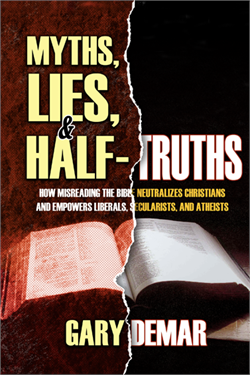A popular minister whose sermons are broadcast on radio and television claims the Bible teaches that God has allowed Satan to be in control of this world until Jesus returns. He gave specific passages like Satan being labeled the “prince of this world” (John 12:31; 14:30; 16:11) and argued that when Satan tempted Jesus in the desert and offered him the kingdoms of this world, Jesus didn’t argue or say anything about the world being Satan’s to control.
Christians will use all types of excuses to keep themselves out of today’s religious, moral, and cultural battles. One of the most diabolical excuses is to claim that Satan is the rightful god of this world. This translates into believing that this world is demonic. Let’s see what the Bible says about this. Satan is a creature. Like all creatures, he has certain limitations. Satan’s limitations have been multiplied since the crucifixion, resurrection, and ascension of Jesus.
The Bible shows us that if we “resist the devil he will flee from” us (James 4:7). The only power that Satan has over the Christian is the power we give him, and the power granted to him by God (2 Cor. 12:7-12). Scripture tells us that Satan is defeated, disarmed, and spoiled (Col. 2:15; Rev. 12:7; Mark 3:27). He has “fallen” (Luke 10:18) and was “thrown down” (Rev. 12:9). He was “crushed” under the feet of the early Christians, and by implication, under the feet of all Christians throughout the ages (Rom. 16:20). He has lost “authority” over Christians (Col. 1:13). He has been “judged” (John 16:11). He cannot “touch” a Christian (1 John 5:18). His works have been destroyed (1 John 3:8). He has “nothing” (John 14:30). He must “flee” when “resisted” (James 4:7). He is “bound” (Mark 3:27; Luke 11:20). Finally, the gates of hell “shall not overpower” the advancing church of the Lord Jesus Christ (Matt. 16:18).[1]

Myths, Lies, and Half-Truths
Myths, Lies, and Half-Truths takes a closer look at God's Word and applies it to erroneous misinterpretations of the Bible that have resulted in a virtual shut-down of the church's full-orbed mission in the world (Acts 20:27). Due to these mistaken interpretations and applications of popular Bible texts to contemporary issues, the Christian faith is being thrown out and trampled under foot by men (Matt. 5:13).
Buy NowWhat does Paul mean when he described Satan as “the god of this world,”[2] as some translations have it. Paul does not use Greek word kosmos but aion. Aion refers to time (age) not place (cosmos). Second Corinthians 4:4 should be translated as “god of this age.” To hear some people tell it, this verse teaches that Satan has all power and authority in this dispensation and in the locale of planet earth. Where God is the God of heaven and of a future age, Satan is the god of this world and this present evil age. This dualistic view of the universe may be part of Greek philosophy, but it has no place in biblical theology.
While it’s true the devil is said to have been the “god of this age,” we know that God is “the King of the ages” (1 Tim. 1:17). Paul stated that Satan is the chosen god of those who deny Jesus as God’s rightful heir of all things (Matt. 22:1-14). These are the true antichrists (2 John 2:7; 1 John 2:18-22; 4:1-3). Jesus is in possession of “all authority,” in both heaven and earth (Matt. 28:18-20). How can this be if Satan is in control of the kingdoms of the earth and Jesus is “the King of the ages” (1 Tim. 1:17)? As the above verses show, Satan is a second-class creature who has been cast out and judged: “Now judgment is upon this world; now the ruler of this world shall be cast out” (John 12:31). When was this judgment? It was in the first century, in what we can designate as the Apostolic age. Bible commentator Adam Clarke (1760-1832) wrote:
The judgment spoken of in this place is applied by some to the punishment which was about to fall on the Jewish people for rejecting Christ. And the ruler or prince … of this world, is understood to be Satan, who had blinded the eyes of the Jews, and hardened their hearts, that they might not believe on the Son of God; but his kingdom, not only among the Jews, but in all the world, was about to be destroyed by the abolition of idolatry and the vocation of the Gentiles.
John Gill (1697-1771) argues in a similar way. Note the timing of this event. It is not a distant eschatological event but one that was happening because of the work of Jesus:
That is, in a very short time will be the judgment either of the Jewish world, when that shall be reproved, convinced, and condemned for their sin of rejecting Christ, and crucifying him, by the Spirit, in the ministration of the Gospel; and they still continuing in their impenitence and unbelief, in process of time wrath will come upon them, upon their nation, city, and temple, to the uttermost; or of the Gentile world, when there shall be a discrimination, and separation made in it, of the chosen of God, who shall be called by special grace, and with the converted and believing Jews, shall form a Gospel church state, separate from the world of the ungodly; or of the world of God’s elect among Jews and Gentiles, whose cause, being undertook by Christ, he will now vindicate it, and redeem them from sin and Satan, who have usurped a power and dominion over them. . . . now the time was at hand, when he should be cast out of the empire of the world he had assumed, and out of the temples of the Gentiles, and out of the hearts of God’s elect among them.
Notice how John 12:31 is linked inextricably with the next verse: “And I, if I be lifted up from the earth, will draw all men to Myself.” John Lightfoot puts a sharp point on the meaning of the passage: “Our Saviour therefore observing at this time some of the Greeks, that is, the Gentiles, pressing hard to see him, he joyfully declares, that the time is coming on apace wherein this prince must be unseated from his throne and tyranny: ‘And I, when I shall be lifted up upon the cross, and by my death shall destroy him who hath the power of death, then will I draw all nations out of his dominion and power after me.’” We are to believe, following modern-day prophecy writers, that Jesus satisfied Divine justice on the cross and Satan remains the ruler of this world. Further in John’s gospel we learn that “the ruler of this world has been judged” (John 16:11).
What, then, does Paul mean when he describes Satan as “the god of this age”? First, we must never allow one passage to finalize our understanding of a doctrine. Scripture must be compared with Scripture. There are no contradictions. Therefore, we can’t have the Bible saying of the one true God, “I am the LORD, and there is no other; besides Me there is no God” (Isa. 45:5) and then make Satan a rival god. Paul must have something else in mind. We can’t say that Satan has been judged and cast out, something that does not happen to gods, and still maintain that he is the god of this world like the way Jehovah is God of this world. Paul is making a redemptive historical point. For example, Jesus tells the Pharisees that the devil is their father (John 8:44). We know that Satan is not their biological father. Rather, he is their spiritual father in that they rejected their true Father and His Son, Jesus Christ.
Physically these Jews, to be sure, are children of Abraham; but spiritually and morally—and that was the issue—they are the children of the devil.[3]
Jesus described the devil as one who gives birth to a worldview, a worldview that includes lying and murder. In this sense, Satan is their spiritual father. In the same way, Satan is a god to those who cling to the fading glory of the old covenant order with its types and shadows, “the ministry of death” (2 Cor. 3:7). This was the age over which he was a god, an age that “has no glory on account of the glory that surpasses it” (v. 10).
Second, the devil is chosen as a god by “those who are perishing,” and he must blind them before they will follow him: “The god of this age has blinded the minds of the unbelieving, that they might not see the light of the gospel of the glory of Christ, who is the image of God” (2 Cor. 4:4). This passage teaches that unbelievers are fooled into believing that “the old covenant” where the “veil remains unlifted” is the way to life (v. 14). Satan is the god of the “ministry of death.” The “god of this age” (aion) keeps them in bondage, “but whenever a man turns to the Lord, the veil is taken away” (v. 16). Liberty from the ministry of death only comes where the Spirit of Lord is: “Now the Lord is the Spirit; and where the Spirit of the Lord is, there is liberty” (v. 17). But Satan had blinded the eyes of the unbelieving so they could not see the lifted veil. They continued to trust in the shadows of the Old Covenant.

Paradise Restored: A Biblical Theology of Dominion
When it was first published 40 years ago, Paradise Restored helped to precipitate a massive paradigm shift in the Evangelical and Reformed world from abject pessimism to unabashed optimism. This new edition is more useful than ever. Newly re-typeset with multiple indexes, it will help a whole new generation grasp how deep, how wide, how strong, and how certain is the finished work of redemption in Jesus Christ.
Buy NowThird, like idols in general, the devil is “by nature” not a god (Gal. 4:8; cf. Deut. 32:17; Ps. 96:5; Isa. 44:9-20; 1 Cor. 8:4; 10:20). In Philippians 3:19, Paul tells us that those who are “enemies of the cross of Christ” worship “their appetite”: “For many walk, of whom I often told you, and now tell you even weeping, that they are enemies of the cross of Christ, whose end is destruction, whose god is their appetite, and whose glory is in their shame, who set their minds on earthly things,” that is the fading remnants of the Old Covenant that was passing away right before their eyes (Heb. 8:13). The appetite is not a god, but it can be made into one.
Fourth, the only way Satan could pass himself off as a god was to blind his victims. Keep in mind that Jesus described the devil as “a liar, and the father of lies” (John 8:44). Though Satan masqueraded as a god, this did make him one.
Satan wishes, albeit vainly, to set himself up as God, and sinners, in rebelling against the true God, subject themselves to him who is the author of their rebellion. The unregenerate serve Satan as though he were their God. They do not thereby, however, escape from the dominion of the one true God. On the contrary, they bring themselves under His righteous judgment; for Satan is a creature and not a God to be served (cf. Rom. 1:18, 25). Just as there is one in the world and every pretended alternative to it is a false no-gospel, so there is only one God of the universe and every other “deity” whom men worship and serve is a false no-god.[4]
When all the evidence is in, we learn that Satan was the false chosen god (naturally) of an age that was passing away. “This age” and “this world” are used “in an ethical sense,” denoting “the immoral realm of disobedience rather than the all-inclusive, extensive scope of creation,” representing “the life of man apart from God and bound to sinful impulses, a world “ethically separated from God.”[5] Calling Satan the “god of this age” is more of a reflection on the condition of that age than the real status of the adversary, whoever that might be. remember that at one point Jesus called Peter “satan,” adversary (Matt. 16:23; Mark 8:33). Chrysostom commented that “Scripture frequently uses the term god, not in regard of the dignity that is so designated, but of the weakness of those in subjection to it; as when he calls mammon lord and belly god: but the belly is neither therefore God nor mammon Lord, save only of those who bow themselves to them.”[6] What is a “synagogue of Satan”? (Rev. 3:9) It seems that the word “satan” is used in different ways. Let’s not forget that Paul wrote to the Romans that Satan would soon be crushed under their feet (16:20). Is this a reference to a spiritual being or an adversary of some kind?
A supporter sent this question to American Vision:
Jesus is Lord and King as of the Resurrection AD 30. The age of the Greek gods, Roman gods, etc. is over. Regarding Satan, he is defeated but does he influence society OR as Christians are we totally immune? I’m confused when I read passages like 1 Corinthians 10:18-22.
How should we understand 1 Corinthians 10:18-22 and the use of the Greek word δαιμόνιον as it relates to the Gentile world?
Look at Israel according to the flesh. Are not those who eat the sacrifices sharers in the altar? [Deut. 14:22-27] What do I mean then? That a thing sacrificed to idols is anything, or that an idol is anything? No, but I say that the things which the Gentiles sacrifice, they SACRIFICE TO DEMONS AND NOT TO GOD. And I do not want you to become sharers in demons. You cannot drink the cup of the Lord and the cup of demons. You cannot partake of the table of the Lord and the table of demons. Or do we PROVOKE THE LORD TO JEALOUSY? Are we stronger than He?
According to Albert Barnes in his commentary on 1 Corinthians Paul refers to the pagan understanding of “demons” (δαιμόνιον) “that were regarded as inferior to the true God; created spirits, or the spirits of people that had been enrolled among the number of the gods.” Like the Greek and Roman gods, of course, they did not exist. “The word ‘demons’ should be used, not ‘devils.’” For example, from The Pulpit Commentary on verse 20: “They sacrificed to demons, who were not God, / To gods whom they have not known, / New gods who came lately,/ Whom your fathers did not know” (Deut. 32:17). History attests that even Israel succumbed to worshipping these so-called gods throughout its history. Psalm 96:5 reads, “All the gods of the nations are idols,” which the Septuagint renders “are demons.”[7]
How should Christians believe about Satan and his minions. Did Jesus defeat them? Are they still roaming around? Is Satan a rival god? What did Jesus mean when He said, “It is finished”? (John 19:30).
Today’s religious ideologies match what Paul was warning about in his letter to the Corinthians. Churches masquerading as “Christian” commune with the “demons”—false ideological gods of the day—while claiming to be the true representatives of Jesus.
[1] The material on Satan was taken from Jay E. Adams, The Christian Counselor’s Manual (Grand Rapids, MI: Baker Book House, 1973), 126-127.
[2] The Greek word in this passage is “age” (Gr: aion).
[3] William Hendriksen, Exposition of the Gospel According to John, New Testament Commentary, 2 vols. (Grand Rapids, MI: Baker Book House, 1953-1954), 2:60.
[4] Philip E. Hughes, Commentary on the Second Epistle of the Corinthians, The New International Commentary on the New Testament (Grand Rapids, MI: Eerdmans, 1962), 127.
[5] Greg L. Bahnsen, “The Person, Work, and Present Status of Satan,” The Journal of Christian Reconstruction, Symposium on Satanism, ed. Gary North, 1:2 (Winter, 1974), 22.
[6] Quoted in Hughes, Commentary on the Second Epistle of the Corinthians, 128.
[7] Gordon D. Fee, The First Epistle to the Corinthians (Grand Rapids: Eerdmans, 1987), 472, note 49.

